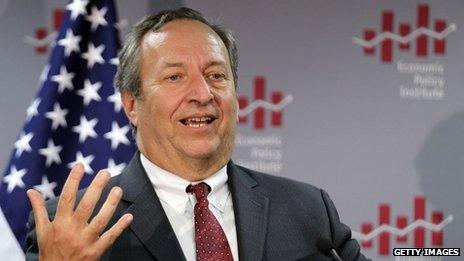Obama, Congress and the next Federal Reserve chair
- Published
- comments

It was always going to be peculiarly challenging to get a majority of US Senators to confirm Larry Summers as the next head of the US Federal Reserve. I am in Washington this week, and what is most surprising to people here is that the Summers' candidacy lasted as long as it did.
One lesson is that President Obama really, really, wants "one of his guys" to run the Fed (and yes, the people who fit this description are all guys). We don't yet know whether he has given up on that goal.
Another conclusion you could draw is that when it comes to the financial system, many Senate Democrats are happier fighting the last war than worrying about the next one.
Janet Yellen was quicker to see the seeds of the 2008-9 financial crisis being planted than Larry Summers was. But today, the financial imbalances that worry people most are the ones coming from the super-loose policies of the Federal Reserve.
When it comes to those policies, it is Yellen - not Summers - who seems to be the true believer.
True, Summers' enemies on Capitol Hill are a broad church. Some Democrats have hated him ever since a politically incorrect memo about the environment was written in his name while he was chief economist at the World Bank.
Financial crisis
But what seems to have damaged him most in his bid for the Fed is his association with the liberalisation of US financial markets when he was working for President Clinton, including the moves to free up investment banking and the trade in derivatives. (Full information: I was working for him at the US Treasury when this was happening.)
Summers' enemies say these reforms helped pave the way for the financial crisis, by allowing enormous imbalances to build up in the under-regulated parts of the system, including the market for credit derivatives.
The then Fed Chair, Alan Greenspan, had argued strongly that the investors in these parts of the market could be trusted to look after their own interests. He was wrong, and the Clinton Treasury is fully implicated in that mistake.
By contrast, Janet Yellen has a record as someone who sounded the financial alarm relatively early. That makes her a much more popular choice in the president's party.
She is also very well qualified for the job. Even the academic heavyweights who came down on Summers' side have said that she would also be a strong choice.
President Obama knows all that. He also knows if he doesn't appoint Yellen, he will seem to have gone out of his way not to appoint the first woman in this crucial job. Even fans of Summers might be uncomfortable with that.
So, global investors might be right to think that Janet Yellen as chairman is now a sure thing. They are probably also right to consider her the more "dove-ish" choice.
Though Summers has been tight-lipped about monetary policy since the start of the crisis, Yellen seems to have fewer reservations about the Fed continuing to have a super-loose policy stance - with or without "tapering". She is also more of a true believer when it comes to the value of forward guidance.
Plan C
As I mentioned at the start, that does not necessarily make her the safe choice right now, at a time when many worry about the distortions building up in the financial system as a result of all this cheap liquidity.
But, President Obama may be less worried about that side to Janet Yellen than the simple fact that he does not know her.
Whatever the truth, he cannot be entirely comfortable with her as Fed chair or he would have have nominated her already.
The word is that Mr Obama tried quite hard to persuade Mr Bernanke to stay in the job. He also tried to get former Treasury Secretary Timothy Geithner to put his hat in the ring.
It is probably too late, now, for the president to revisit these options. It may also be too late for him to appoint his "own man". But having lost Summers, I can't help thinking Mr Obama will spend some time looking for a Plan C.